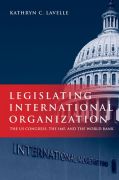
Legislating international organization: the us congress, the imf, and the world bank
Lavelle, Kathryn
In Legislating International Organization, Kathryn Lavelle argues against the commonly-held idea that key international organizations are entities unto themselves, immune from the influence and pressures of individual states' domestic policies. In Legislating International Organization, Kathryn Lavelle arguesagainst the commonly-held idea that key international organizations are entities unto themselves, immune from the influence and pressures of individual states' domestic policies. Covering the history of the IMF and World Bank from their origins, she shows that domestic political constituencies in advanced industrial states have always been important drivers of international financial institution policy.Lavelle focuses in particular on the U.S. Congress, tracing its long history of involvement with these institutions and showing how it wields significant influence. Drawing from archival research and interviews with members and staff, Lavelle shows that Congress is not particularly hostile to the multilateralisminherent in the IMF and World Bank, and has championed them at several key historical junctures. Congress is not uniformly supportive of these institutions, however. As Lavelle illustrates, it is more defensive of its constitutionally designated powers and more open to competing interest group concerns than legislatures in other advanced industrial states. Legislating International Organization will reshape how we think about how the U.S. Congress interacts with internationalinstitutions and more broadly about the relationship of domestic politics to global governance throughout the world. This is especially relevant given the impact of 2008 financial crisis, which has made the issue of multilateralism in American politics more important than ever. INDICE: Preface Introduction 1. Congressional Advocacy Towards International Organizations 2. Enacting a Multilateral Framework for Finance: Treasury and Congressional Compromise 3. Building Constituencies for the Bretton Woods Framework: Banks, Big Business, and the Cold War Coalition 4. Domestic Constituencies Speak: The End of Fixed Parity and the Rise of Development Lending 5.Iron Triangles Go Global: The 1982 Debt Crisis and the End of the Cold War 6. Widening the Circle, Narrowing the Outcome: The 1997 Asian Financial Crisis7. Reviving a Role for the Bretton Woods Institutions: the Financial Crisis of 2008 8. Conclusions Notes Bibliography Index
- ISBN: 978-0-19-976534-8
- Editorial: Oxford University
- Encuadernacion: Cartoné
- Páginas: 256
- Fecha Publicación: 03/11/2011
- Nº Volúmenes: 1
- Idioma: Inglés
